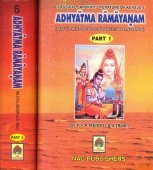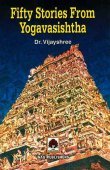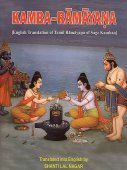Adhyatma, Adhyātma, Adhyātman, Adhyatman: 24 definitions
Introduction:
Adhyatma means something in Buddhism, Pali, Hinduism, Sanskrit, Jainism, Prakrit, Marathi, Hindi. If you want to know the exact meaning, history, etymology or English translation of this term then check out the descriptions on this page. Add your comment or reference to a book if you want to contribute to this summary article.
Alternative spellings of this word include Adhyatm.
In Hinduism
Natyashastra (theatrics and dramaturgy)
Source: Wisdom Library: Nāṭya-śāstraAdhyātma (अध्यात्म) refers to the “personal experience” (the intuitive knowledge of the self). It is one of the three means of valid knowledge (pramāṇa). According to the Nāṭyaśāstra 25.120-121, “Drama (nāṭya) composed of veda and adhyātma is couched in words and metres, is testified by loka (actual life)”.
Source: Google Books: Kalātattvakośa (nāṭya-śāstra)Adhyātma (अध्यात्म).—In music, the identification of the three registers of musical sound, i.e. adhibhūta with adhyātma, viewed in the locations in the human body are so strong that the Nāṭya-śāstra equates the two and mentions only the adhyātma aspect while describing the three sthānas of music, subsuming the adhibhūta. Adhibhūta and adhyātma are intertwined in the sense that the process of sound-production is described with exclusive reference to the human body, mind and ātman.

Natyashastra (नाट्यशास्त्र, nāṭyaśāstra) refers to both the ancient Indian tradition (shastra) of performing arts, (natya—theatrics, drama, dance, music), as well as the name of a Sanskrit work dealing with these subjects. It also teaches the rules for composing Dramatic plays (nataka), construction and performance of Theater, and Poetic works (kavya).
Yoga (school of philosophy)
Source: Wisdom Library: YogaAdhyātma (अध्यात्म) refers to “that which pertains to the body”. The Subālopaniṣad (fifth section) draws correspondences between that which pertains to the body (adhyātma), the elements (adhibhūta) and their presiding deities (adhidaivata).
Source: ORA: Amanaska (king of all yogas): A Critical Edition and Annotated Translation by Jason BirchAdhyātma (अध्यात्म) or Adhyātmavidyā refers to “spiritual (knowledge)”, according to the Haṭhapradīpikā of Svātmārāma: an influential 15th-century Sanskrit manual on Hatha-Yoga dealing with techniques to channel one’s vital energy.—Accordingly, while discussing methods for conquering the mind: “Acquiring spiritual knowledge (adhyātma-vidyā), associating with the wise, abandoning habitual tendencies and stopping the movement of the breath; according to tradition, [all] these methods are effective in conquering the mind. The [mind] is quickly overcome by these [methods of restraint] like the dust of the earth by streams [of water]”.

Yoga is originally considered a branch of Hindu philosophy (astika), but both ancient and modern Yoga combine the physical, mental and spiritual. Yoga teaches various physical techniques also known as āsanas (postures), used for various purposes (eg., meditation, contemplation, relaxation).
Kosha (encyclopedic lexicons)
Source: Google Books: Kalātattvakośa, volume 3Adhyātma (अध्यात्म).—The three terms, viz. adhibhūta, adhidaiva and adhyātma—are known today as a triad but they have also been used singly or in pairs, viz. adhibhūta-adhyātma, adhibhūta-adhidaiva, adhidaiva-adhyātma, their order being insignificant. Basically, the three stand for the outer or tangible (adhibhūta), the intangible described as divine (adhidaiva) and the one pertaining to the ‘self’ identified with the body, mindm, ātman, etc. (adhyātma). This triad has very deep roots in Indian though reflected in Vedic and later literature.
Adhyātma has been identified here with svabhāva which is explained by Abhinavagupta in his commentary as caitanyabhāva that is never dissociated from self. The most common meaning of the term adhyātma is ‘belonging to self’, or ‘one’s corporeal body’, ‘concerning an individual’. The term ātman is of crucial significance in Indian thought. Basically it denotes the essence of anything that is all-pervading. The etymology of the word ātman is uncertain. It is variously derived from the roots an-‘to breath’ (cf. prāṇa), at-‘to move’, or vā-‘to blow’. With adhi, it forms a neuter indeclinable compound adhyātman.
Kosha (कोश, kośa) refers to Sanskrit lexicons intended to provide additional information regarding technical terms used in religion, philosophy and the various sciences (shastra). The oldest extant thesaurus (kosha) dates to the 4th century AD.
Ayurveda (science of life)
Source: gurumukhi.ru: Ayurveda glossary of termsĀdhyātma (आध्यात्म):—The psycho-spiritual

Āyurveda (आयुर्वेद, ayurveda) is a branch of Indian science dealing with medicine, herbalism, taxology, anatomy, surgery, alchemy and related topics. Traditional practice of Āyurveda in ancient India dates back to at least the first millenium BC. Literature is commonly written in Sanskrit using various poetic metres.
Shaivism (Shaiva philosophy)
Source: Brill: Śaivism and the Tantric TraditionsĀdhyātma (आध्यात्म) [=Adhyātmika?] refers to the “internal wheel (cakra)”, according to verse 87.140 of the Brahmayāmala-tantra (or Picumata), an early 7th century Śaiva text consisting of twelve-thousand verses.—Accordingly, “One should meditate upon the internal (ādhyātma) [wheel/cakra] as external, and the external likewise as internal (adhyātmika). Considering [these] to be identical, one should then commence installation [of the mantra-deities] on the cakra”.

Shaiva (शैव, śaiva) or Shaivism (śaivism) represents a tradition of Hinduism worshiping Shiva as the supreme being. Closely related to Shaktism, Shaiva literature includes a range of scriptures, including Tantras, while the root of this tradition may be traced back to the ancient Vedas.
In Buddhism
Mahayana (major branch of Buddhism)
Source: Wisdom Library: Maha Prajnaparamita SastraAdhyātma (अध्यात्म) or Adhyātmacitta refers to the “inner mind”, according to Mahāprajñāpāramitāśāstra (chapter 19).—Accordingly, “When generosity is practiced, the six sense organs (ṣaṣ-indriya) are purified (prasanna) and a good mind of desire (kuśalakāmacitta) is produced. When this is produced, the inner mind (adhyātma-citta) is purified. When the virtues (guṇa) of the fruit of retribution (vipākaphala) are considered, a mind of faith (śraddhacitta) is produced. The body (kāya) and the mind (citta) become softened (mṛdutaruṇa), joy (ānanda) arises. Joy having arisen, a ‘single-mindedness’ (ekacitta) is obtained, thanks to which real wisdom (bhūtaprajñā) is produced: these are the good dharmas that are acquired”.

Mahayana (महायान, mahāyāna) is a major branch of Buddhism focusing on the path of a Bodhisattva (spiritual aspirants/ enlightened beings). Extant literature is vast and primarely composed in the Sanskrit language. There are many sūtras of which some of the earliest are the various Prajñāpāramitā sūtras.
General definition (in Buddhism)
Source: Wisdom Library: Dharma-samgrahaAdhyātma (अध्यात्म) or adhyātmaśūnyatā refers to “internal emptiness” one of the “twenty emptinesses” (śūnyatā) as defined in the Dharma-saṃgraha (section 41). The Dharma-samgraha (Dharmasangraha) is an extensive glossary of Buddhist technical terms in Sanskrit (e.g., adhyātma). The work is attributed to Nagarjuna who lived around the 2nd century A.D.
In Jainism
General definition (in Jainism)
Source: The University of Sydney: A study of the Twelve ReflectionsĀdhyātma (आध्यात्म) refers to “internal (asceticism)”, according to the 11th century Jñānārṇava, a treatise on Jain Yoga in roughly 2200 Sanskrit verses composed by Śubhacandra.—Accordingly, “In that regard, external asceticism is declared to be of six kinds beginning with fasting while internal [asceticism] (ādhyātma) is also of [six] kinds on account of the divisions beginning with atonement. Hardship of the limbs of the body is excellent in respect of the divisions beginning with fasting. Internal [asceticism] in the form of meditation is excellent in respect of the divisions beginning with atonement”.
Synonyms: Abhyantara.

Jainism is an Indian religion of Dharma whose doctrine revolves around harmlessness (ahimsa) towards every living being. The two major branches (Digambara and Svetambara) of Jainism stimulate self-control (or, shramana, ‘self-reliance’) and spiritual development through a path of peace for the soul to progess to the ultimate goal.
Languages of India and abroad
Marathi-English dictionary
Source: DDSA: The Molesworth Marathi and English Dictionaryadhyātma (अध्यात्म).—n S The sense, faculty, or power which apprehends, takes cognizance of, receives impressions from an adhibhūta or entity. See adhidēvata. 2 Dissertation or discourse on the Deity as the mundane soul or pervading and ruling spirit. Ex. āja purāṇānta kathā navhatī a0 ca nighālēṃ or gōsāvyānēṃ kathā phāra lāvalī nāhīṃ a0 ca lāvalēṃ hōtēṃ.
--- OR ---
adhyātmā (अध्यात्मा).—m S The soul; the spirit as individuate or distinct from the Supreme essence, and as presiding over the body. 2 Knowledge of self, or of spirit, or of the Deity.
Source: DDSA: The Aryabhusan school dictionary, Marathi-Englishadhyātma (अध्यात्म).—n The supreme spirit mani- fested as the individual self.
--- OR ---
adhyātmā (अध्यात्मा).—m The soul; knowledge of self.
Marathi is an Indo-European language having over 70 million native speakers people in (predominantly) Maharashtra India. Marathi, like many other Indo-Aryan languages, evolved from early forms of Prakrit, which itself is a subset of Sanskrit, one of the most ancient languages of the world.
Sanskrit dictionary
Source: DDSA: The practical Sanskrit-English dictionaryAdhyātma (अध्यात्म).—a. [ātmana. saṃbaddhaṃ, ātmani adhikṛtaṃ vā] Belonging to self or person; concerning an individual.
-tmam ind. [ātmānamadhikṛtya] Concerning self.
-tmam The supreme spirit (manifested as the individual self) or the relation between the supreme and the individual soul; अक्षरं ब्रह्म परमं स्वभावोऽध्यात्ममुच्यते (akṣaraṃ brahma paramaṃ svabhāvo'dhyātmamucyate) Bhagavadgītā (Bombay) 8.3 (svasyaiva brahmaṇa evāṃśatayā jīvasvarūpeṇa bhāvo bhavanaṃ sa eva ātmānaṃ dehamadhikṛtya bhoktṛ- tvena vartamāno'dhyātmaśabdenocyate Śrīdhara) 'Brahman is the supreme, the indestructible; its manifestation (as an individual self) is अध्यात्म (adhyātma)' -Telang's Bhagavadgītā;
-tman 1 Egotism; कर्माण्यध्यात्मना रुद्रे यदहं ममता क्रिया (karmāṇyadhyātmanā rudre yadahaṃ mamatā kriyā) Bhāg. 7.12.29.
2) Wind; स्पर्शमध्यात्मनि त्वचम् (sparśamadhyātmani tvacam) Bhāgavata 7.12.27. °चेतसा (cetasā) Bhagavadgītā (Bombay) 3.3.
Source: Cologne Digital Sanskrit Dictionaries: Shabda-Sagara Sanskrit-English DictionaryAdhyātman (अध्यात्मन्).—m.
(-tmā) 1. The soul, individuated spirit, or that which belongs to and presides over the body. 2. The supreme spirit. E. adhi, and ātman self or soul.
Source: Cologne Digital Sanskrit Dictionaries: Benfey Sanskrit-English DictionaryAdhyātma (अध्यात्म).—i. e. adhi-ātman, n. The supreme soul, [Bhagavadgītā, (ed. Schlegel.)] 8, 3.
Source: Cologne Digital Sanskrit Dictionaries: Cappeller Sanskrit-English DictionaryAdhyātma (अध्यात्म).—[adjective] concerning one’s self, one’s own; [neuter] [adverb] (tmama), as subst. the supreme soul.
Source: Cologne Digital Sanskrit Dictionaries: Monier-Williams Sanskrit-English Dictionary1) Adhyātma (अध्यात्म):—[=adhy-ātma] n. the Supreme Spirit
2) [v.s. ...] mfn. own, belonging to self
Source: Cologne Digital Sanskrit Dictionaries: Goldstücker Sanskrit-English DictionaryAdhyātma (अध्यात्म):—I. [tatpurusha compound] n.
(-tmam) The supreme soul or ātman (q. v.), sometimes considered as identical with prāṇa (q. v.) and, in the sectarian doctrine, especially with Nārāyaṇa or Viṣṇu. Ii. Avyayībh.
(-tmam) Concerning or relating to soul, life &c.; see ātman. A chapter in the Upan. treating thereon contains the following subjects: the lower jaw, the upper jaw, speech and tongue; another passage comprises under this topic
1) the vital airs: prāṇa, apāna, vyāna, udāna, samāna,
2) the organs of sensation: eyes, ears, manas, speech, skin (tvach) and
3) the elementary parts of the body: skin (charman), flesh, tendons, bones, marrow. E. adhi and ātman, samāsānta aff. ṭac.
Source: Cologne Digital Sanskrit Dictionaries: Yates Sanskrit-English DictionaryAdhyātman (अध्यात्मन्):—[adhyā+tman] (tmā) 5. m. Spirituality; all-pervading spirit; the soul.
Source: DDSA: Paia-sadda-mahannavo; a comprehensive Prakrit Hindi dictionary (S)Adhyātma (अध्यात्म) in the Sanskrit language is related to the Prakrit words: Ajbhattha, Ajbhappa.
[Sanskrit to German]
Sanskrit, also spelled संस्कृतम् (saṃskṛtam), is an ancient language of India commonly seen as the grandmother of the Indo-European language family (even English!). Closely allied with Prakrit and Pali, Sanskrit is more exhaustive in both grammar and terms and has the most extensive collection of literature in the world, greatly surpassing its sister-languages Greek and Latin.
Hindi dictionary
Source: DDSA: A practical Hindi-English dictionaryAdhyātma (अध्यात्म) [Also spelled adhyatm]:—(nm) spiritual contemplation; —[jñāna] spiritual knowledge; ~[paraka] spiritual; hence ~[parakatā] (nf);—[yoga] the discipline involved in withdrawal of senses from mundane objects and their concentration on the Supreme Being; ~[vāda] spiritualism; -[vidyā/śāstra] metaphysics.
...
Kannada-English dictionary
Source: Alar: Kannada-English corpusAdhyātma (ಅಧ್ಯಾತ್ಮ):—[adjective] of or relating to the Self, and the Supreme; of the spirit or the soul as distinguished from the body or material matters, characterised by the ascendancy of the spirit; showing much refinement of thought and feeling; spiritual.
--- OR ---
Adhyātma (ಅಧ್ಯಾತ್ಮ):—
1) [noun] that which is concerned with the Supreme and the individual soul and the relation between them.
2) [noun] the philosophical doctrine that all reality is in essence spiritual; spiritualism.
3) [noun] spiritual character, quality or nature; spirituality.
4) [noun] the true nature of the soul and the Supreme Spirit.
5) [noun] any organ or structure, as an eye or a taste bud, containing afferent nerve terminals that are specialised to receive specific stimuli and transmit them to the brain; a sense organ.
Kannada is a Dravidian language (as opposed to the Indo-European language family) mainly spoken in the southwestern region of India.
See also (Relevant definitions)
Starts with (+41): Aadhyatmavaad, Adhyatmabahirdha, Adhyatmabahirdhashunyata, Adhyatmabhagavata, Adhyatmabindu, Adhyatmabodha, Adhyatmacandrika, Adhyatmacetas, Adhyatmacinta, Adhyatmacintamani, Adhyatmacitta, Adhyatmadarshana, Adhyatmadhyana, Adhyatmadi, Adhyatmadrish, Adhyatmagita, Adhyatmaguna, Adhyatmajnana, Adhyatmaka, Adhyatmakalpadruma.
Ends with: Nishkaladhyatma.
Full-text (+90): Adhyatmika, Adhyatmarati, Adhyatmavid, Adhyatmam, Adhyatmadrish, Adhidaiva, Adhyatmottarakanda, Adhyatmavrish, Adhibhuta, Adhidaivata, Adhyatmaramayana, Adhyatmashunyata, Adhyatmavidya, Adhyatmajnana, Adhyatmavit, Adhyatmacintamani, Adhyatmashastra, Aadhyatmavaad, Tac, Attiyattumam.
Relevant text
Search found 68 books and stories containing Adhyatma, Adhyātma, Adhyātman, Adhyatman, Adhyātmā, Adhi-atma, Adhi-ātma, Ādhyātma, Adhi-ātman, Adhi-atman; (plurals include: Adhyatmas, Adhyātmas, Adhyātmans, Adhyatmans, Adhyātmās, atmas, ātmas, Ādhyātmas, ātmans, atmans). You can also click to the full overview containing English textual excerpts. Below are direct links for the most relevant articles:
Shrimad Bhagavad-gita (by Narayana Gosvami)
Verse 7.29 < [Chapter 7 - Vijñāna-Yoga (Yoga through Realization of Transcendental Knowledge)]
Verse 8.1 < [Chapter 8 - Tāraka-brahma-yoga (the Yoga of Absolute Deliverance)]
Verse 8.3 < [Chapter 8 - Tāraka-brahma-yoga (the Yoga of Absolute Deliverance)]
Jnaneshwari (Bhavartha Dipika) (by Ramchandra Keshav Bhagwat)
Verse 8.1 < [Chapter 8 - Akshara-brahman-yoga]
Verse 8.3 < [Chapter 8 - Akshara-brahman-yoga]
Verse 11.1 < [Chapter 11 - Vishvarupa-darshana-yoga]
Maha Prajnaparamita Sastra (by Gelongma Karma Migme Chödrön)
Class 6: The eight spheres of mastery (abhibhvāyatana, abhibhu-āyatana) < [Class (5) liberations, (6) masteries and (7) totalities]
Class 5: The eight liberations (vimokṣa) < [Class (5) liberations, (6) masteries and (7) totalities]
3. Second dhyāna < [Part 3 - Definition of the various dhyānas and samāpattis]
Garga Samhita (English) (by Danavir Goswami)
Verse 4.19.82 < [Chapter 19 - A Thousand Names of Srī Yamunā]
Verse 5.16.26 < [Chapter 16 - Comforting Sri Radha and the Gopis]
Kena upanishad (Madhva commentary) (by Srisa Chandra Vasu)
Mantra 4.5 < [Book 4 - Caturtha-Khaṇḍa]
Thirty minor Upanishads (by K. Narayanasvami Aiyar)
Related products





